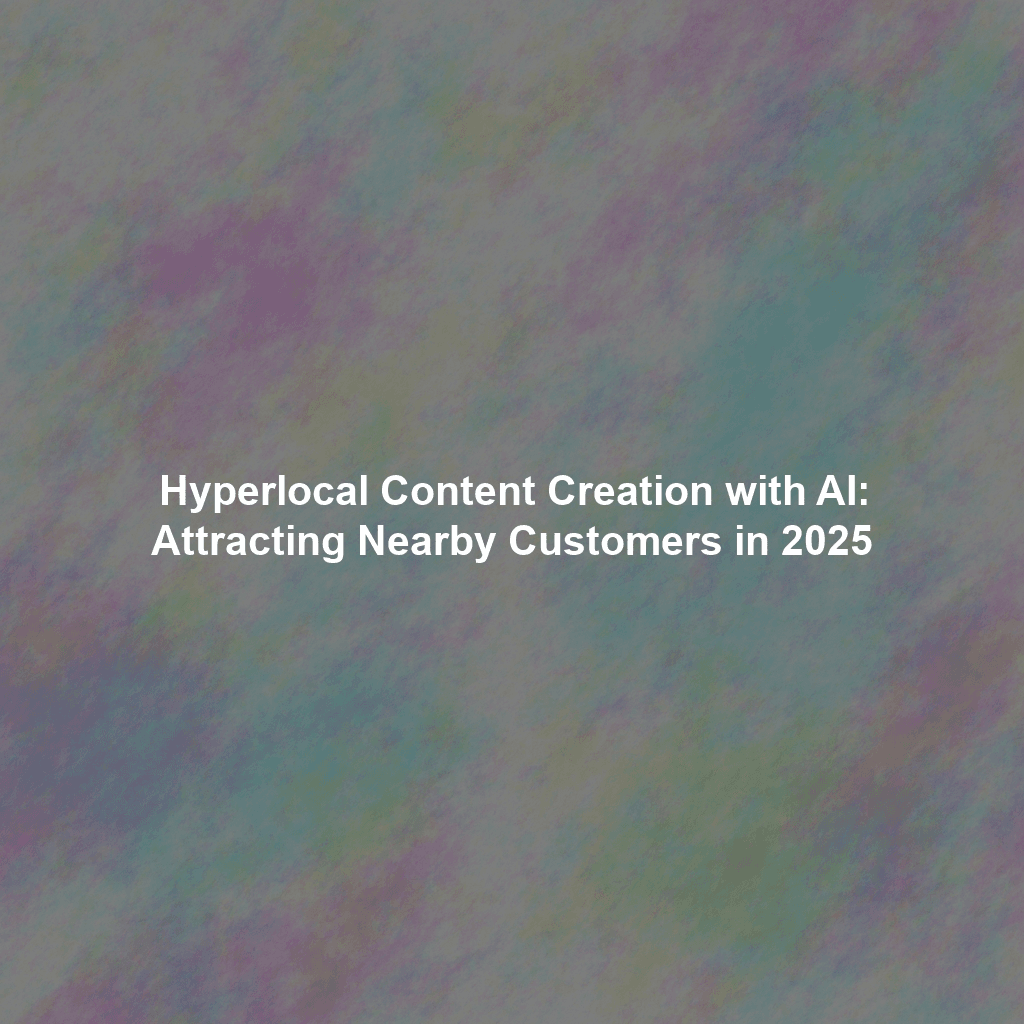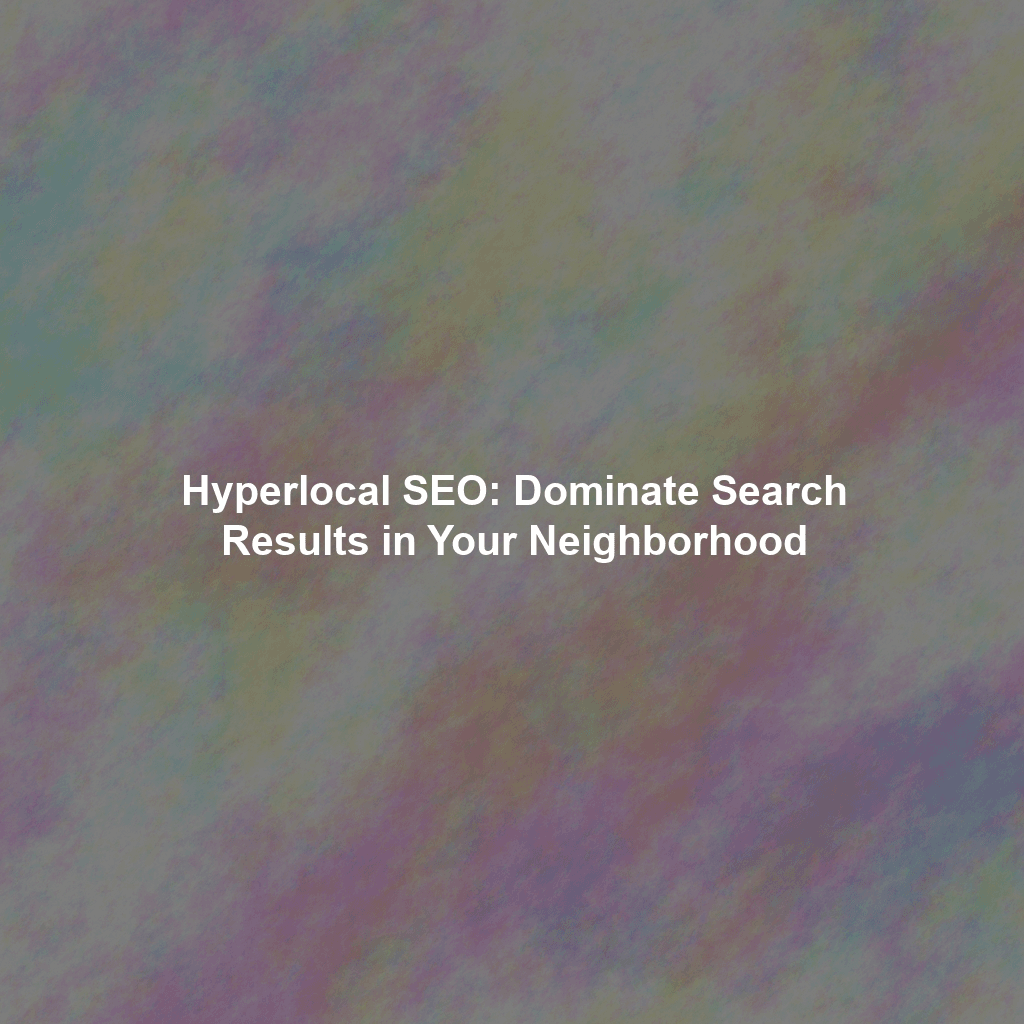Staying significantly ahead of the curve is an absolute imperative for local businesses.
As we rapidly approach 2025, Artificial Intelligence (AI) is no longer a futuristic concept confined to sci-fi movies or Silicon Valley boardrooms; it is a tangible, accessible, and profoundly transformative tool that can revolutionize how businesses connect with their local communities and compete effectively on platforms like Google. The stakes are high: adapt or risk being left behind. One of the most impactful, yet often underutilized, applications of AI lies in the realm of hyperlocal content creation – the strategic ability to craft highly relevant, deeply engaging, and uniquely personalized content targeted at specific neighborhoods, micro-communities, and demographic segments within your immediate vicinity. This isn’t just about being found; it’s about being the trusted, local authority, forging genuine connections that drive foot traffic and foster unwavering loyalty. It’s about using cutting-edge technology to reinforce the very essence of local business: community.
The Rise of Hyperlocal Content and Why It Matters: Beyond Generic Marketing
In today’s content-saturated world, generic, one-size-fits-all marketing messages are becoming increasingly ineffective, often dismissed as irrelevant noise. Modern consumers crave personalized experiences; they want to engage with businesses that demonstrate a genuine understanding of their specific needs, interests, and the unique context of their local lives. Hyperlocal content directly addresses this surging demand by providing information that is acutely relevant to a particular geographic area and the people who live, work, and play there. This can include anything from local news updates, community events, and neighborhood-specific initiatives to highly personalized offers and recommendations tailored to local preferences. It’s about speaking directly to the heart of the community.
Why is this increasingly important for Google and other search engines? Google’s algorithm, in its continuous evolution, increasingly favors websites and businesses that provide valuable, authoritative, and locally relevant content to users. This is particularly evident in the prominence of the “local pack” (map results) and localized organic search results. By consistently creating and optimizing hyperlocal content, local businesses can significantly improve their search engine ranking for local keywords (e.g., “best bakery in Fishtown,” “plumber near Rittenhouse Square”), attract more nearby, high-intent customers, and build stronger, more authentic relationships within their communities. It signals to Google that you are an integral, valuable part of that specific local ecosystem.
- Enhanced Local SEO: Hyperlocal content is a direct signal to search engines about your geographic relevance, boosting your visibility in local search queries and map results.
- Increased Local Traffic & Conversions: Highly relevant content attracts local customers who are actively looking for specific products or services in their immediate area, leading to higher conversion rates.
- Stronger Community Engagement: By addressing local topics and initiatives, you foster a sense of community, encouraging local residents to engage with your brand and become loyal customers.
- Building Local Authority & Trust: Providing valuable, localized information positions your business as a trusted expert and a valuable resource within the community.
- Reduced Ad Spend: Improved organic local rankings can reduce your reliance on expensive paid local advertising.
For more on Google’s emphasis on local relevance, explore their Google Business Profile guidelines, which highlight proximity, relevance, and prominence.
Leveraging AI for Hyperlocal Content Creation in 2025: Your Smart Assistant
The advent of sophisticated AI technologies is revolutionizing the creation, optimization, and distribution of hyperlocal content, transforming what was once a time-consuming, manual process into an efficient, scalable operation. Here’s how local businesses can strategically harness AI’s power to connect more deeply with their communities in 2025:
AI-Powered Content Generation Tools: From Idea to Draft in Minutes
Gone are the days of manually crafting every single blog post, social media update, local news snippet, or community announcement. AI-powered content generation tools can now act as invaluable assistants, significantly speeding up the creation of various types of hyperlocal content efficiently and at scale. These tools, often leveraging advanced Large Language Models (LLMs), can:
- Generate Hyperlocal Blog Posts: Based on local trends, upcoming events, specific community interests, or common customer pain points, AI can rapidly generate engaging blog posts. For example, a local hardware store could use AI to write a blog post about “Preparing Your Old City Home for Winter: A Guide to Insulation and Heating Tips,” tailored to the specific climate and common architectural issues in their area. A local pet store could generate “Top Dog Parks in Fairmount for Your Furry Friend.”
- Craft Engaging Social Media Updates: AI can create dynamic and engaging social media updates that promote local events, highlight community initiatives, share relevant neighborhood news, or even offer localized tips. These updates can be tailored to specific demographics within the area (e.g., “Parents in Manayunk, check out these family-friendly events!”), ensuring maximum reach and engagement on platforms like Facebook, Instagram, or Nextdoor.
- Summarize Local News and Events: AI can automatically aggregate and summarize local news stories from various sources (local newspapers, community blogs, city announcements), providing your customers with a convenient, curated way to stay informed about what’s happening right in their neighborhood. This can be a valuable, time-saving service for busy residents who want to stay connected to their community without sifting through multiple sources.
- Develop Local FAQs and Guides: AI can assist in creating comprehensive FAQs about local services, common neighborhood questions, or guides to local attractions, positioning your business as a knowledgeable resource.
Personalizing Content with AI: The Power of Individual Relevance
Personalization is no longer a luxury; it’s a fundamental expectation for today’s consumers. AI excels at analyzing vast amounts of customer data to create highly personalized content experiences that resonate deeply with individual preferences, past behaviors, and evolving needs. This level of tailored communication significantly enhances engagement and conversion rates:
- Personalized Email Marketing Campaigns: AI can analyze customer purchase history, browsing behavior on your website, demographic information, and even local weather patterns to create highly targeted email campaigns that promote relevant products and services. For example, a local restaurant could send personalized emails offering discounts on dishes a customer has previously ordered, or suggesting new seasonal items to those who live nearby. A local clothing boutique could send alerts about new arrivals that match a customer’s past style preferences.
- Dynamic Website Content Adaptation: AI can dynamically adjust website content in real-time based on the user’s detected location, their demographics, browsing history, or the time of day. This ensures that visitors see information that is most relevant and compelling to them, improving their overall experience, reducing bounce rates, and significantly increasing the likelihood of conversion. Imagine a local car dealership’s website showing different promotions based on the user’s specific zip code.
- Targeted Push Notifications: For businesses with mobile apps, AI can power personalized push notifications, alerting customers to in-store specials when they are within a certain radius of your location, or reminding them of an upcoming local event you’re hosting.
For more on personalization in marketing, resources from McKinsey & Company provide valuable insights.
Optimizing Local Keyword Targeting with AI: Precision Discoverability
Effective keyword targeting is the bedrock of improving search engine ranking and attracting nearby, high-intent customers. AI is a powerful ally in identifying the most relevant local keywords and optimizing your content to rank for them, ensuring your business is found by those actively searching for what you offer in your area:
- Advanced Local Keyword Research: AI-powered keyword research tools can analyze vast amounts of search data, including local search trends, voice search queries, and long-tail keywords, to identify the precise words and phrases that are most frequently used by local residents when searching for products and services. This goes beyond generic terms to highly specific local queries.
- Intelligent Content Optimization: AI can analyze your existing content and suggest highly specific ways to optimize it for relevant local keywords. This includes recommendations for title tags, meta descriptions, headings, body text, and even image alt text, ensuring your content is perfectly aligned with local search intent and ranks higher in search results.
- Comprehensive Competitor Analysis: AI can quickly analyze competitor websites and local listings to identify the keywords they are targeting, their content gaps, and their local SEO strengths and weaknesses. This provides invaluable insights for businesses to differentiate themselves and uncover untapped opportunities in the local market.
- Google Business Profile Optimization: AI tools can help optimize your Google Business Profile (GBP) by suggesting relevant categories, services, products, and even posts based on local search trends and competitor activity, maximizing your visibility in Google Maps and the local pack.
Boosting Engagement with AI-Powered Chatbots: 24/7 Local Support
AI-powered chatbots are transforming customer service and engagement for local businesses. These intelligent virtual assistants can provide instant customer support, answer common questions, and engage with potential customers 24/7, even outside of business hours. This significantly improves customer satisfaction, reduces staff workload, and increases the likelihood of conversions. Chatbots can be highly customized to answer questions specific to the local area, acting as a true digital concierge:
- Instant Local Information: Chatbots can provide immediate answers to common local queries such as directions to your store, current hours of operation, parking availability, or details about upcoming local events you’re participating in.
- Personalized Recommendations: For restaurants, a chatbot could recommend dishes based on dietary restrictions or popular local favorites. For retail, it could suggest products based on a customer’s stated interest.
- Lead Qualification and Appointment Booking: Chatbots can qualify leads by asking a series of questions and then seamlessly book appointments or reservations, integrating directly with your scheduling system.
- Multilingual Support: AI chatbots can often communicate in multiple languages, allowing businesses to serve diverse communities within their local area without needing multilingual staff present at all times.
- Feedback Collection: Chatbots can be used to gather customer feedback, providing valuable insights into local preferences and areas for improvement.
For more on the impact of chatbots, see reports from sources like Gartner on Customer Service Trends.
Examples of AI-Powered Hyperlocal Content in Action: Real-World Scenarios
Let’s look at some practical, tangible examples of how local businesses across various sectors can effectively leverage AI to create compelling hyperlocal content, driving engagement and growth:
- A Local Coffee Shop in Queen Village, Philadelphia:
- Uses AI to generate weekly blog posts about “The Best Hidden Gems for Coffee Lovers in Queen Village” or “Upcoming Community Events Near Our Cafe.”
- Offers personalized discounts via email to customers who live within a certain radius, based on their past purchase history (e.g., “Your usual latte is 15% off today, [Customer Name]!”).
- Deploys an AI-powered chatbot on their website and Facebook Messenger to answer questions about their menu, daily specials, Wi-Fi access, and upcoming local music nights.
- A Real Estate Agency Serving the Main Line, PA:
- Utilizes AI to create in-depth blog posts comparing the benefits of living in different Main Line neighborhoods (e.g., “Ardmore vs. Bryn Mawr: Which Main Line Town is Right for You?”), incorporating local school data and amenities.
- Offers personalized property recommendations via email or website pop-ups based on customer preferences (e.g., “Homes with 4+ bedrooms in Lower Merion School District just hit the market!”).
- Uses an AI chatbot to schedule showings, answer common questions about property taxes in specific townships, or provide instant market reports for a given zip code.
- A Local Gym in Northern Liberties, Philadelphia:
- Employs AI to create blog posts about healthy living tips tailored to the local climate (e.g., “Staying Fit During Philly’s Humid Summers”) or local fitness events (e.g., “Your Guide to the Northern Liberties 5K”).
- Offers personalized workout plans or class recommendations via their app based on customer fitness levels, goals, and past attendance.
- Integrates an AI chatbot on their website to answer questions about membership options, class schedules, personal trainer availability, and even provide directions from local landmarks.
- A Boutique Pet Store in Chestnut Hill, PA:
- Uses AI to generate social media content highlighting “Pet-Friendly Spots in Chestnut Hill” or “Local Dog Walking Routes with the Best Views.”
- Sends personalized email offers for pet food based on a customer’s pet breed and age, or alerts about local pet adoption events.
- Their chatbot answers questions about specific product availability, grooming appointments, or local vet recommendations.
The Future of Hyperlocal Content and AI: An Accelerating Trajectory
As AI technology continues its rapid and relentless evolution, its impact on hyperlocal content creation will only grow stronger, becoming more sophisticated and integrated. In the future, we can expect to see even more advanced AI tools that can:
- Generate Content in Multiple Languages and Dialects: Allowing businesses to seamlessly reach and engage with diverse linguistic communities within their local area, fostering inclusivity and expanding market reach.
- Create Personalized Video Content on the Fly: AI will be able to generate short, personalized video snippets for individual customers, perhaps featuring their name or specific product recommendations, further enhancing engagement and brand loyalty. Imagine a local car dealer sending a personalized video message to a lead about a specific car model they viewed online.
- Predict Future Local Trends and Needs: Leveraging advanced predictive analytics, AI will help businesses proactively adapt their content strategy to meet changing customer needs, anticipate local events, or capitalize on emerging community interests before they become mainstream.
- Automated Local SEO Audits and Action Plans: AI will provide real-time, granular audits of a business’s local SEO performance, identifying gaps in hyperlocal content, citation inconsistencies, and suggesting immediate, actionable optimization plans.
- Hyper-Contextual Content Delivery: AI will enable content to be delivered not just based on location, but on real-time context – e.g., showing an ad for an umbrella when it starts raining in a specific neighborhood, or promoting a hot coffee special on a cold morning.
- Voice Search Optimization: As voice search continues to grow, AI will be crucial in optimizing hyperlocal content for natural language queries, ensuring businesses are found when users ask questions like “Where’s the best vegan restaurant near me right now?”
Conclusion: The Imperative of Embracing AI for Local Dominance
In 2025, Artificial Intelligence will be far more than just a competitive advantage; it will be an indispensable tool for local businesses looking to not only compete effectively on Google but to truly dominate their local markets and forge deeper, more meaningful connections with their communities. By strategically leveraging AI to generate engaging, deeply personalized, and meticulously optimized hyperlocal content, businesses can attract a significantly larger volume of nearby, high-intent customers, build stronger, more authentic relationships rooted in relevance, and achieve sustainable, measurable growth in an increasingly crowded digital landscape. Embracing AI is no longer a choice for survival; it is a strategic necessity for thriving and leading in the hyperlocal future. The businesses that integrate AI into their content strategy today will be the ones that own their local communities tomorrow, turning digital innovation into tangible local success.
 Skip to content
Skip to content

